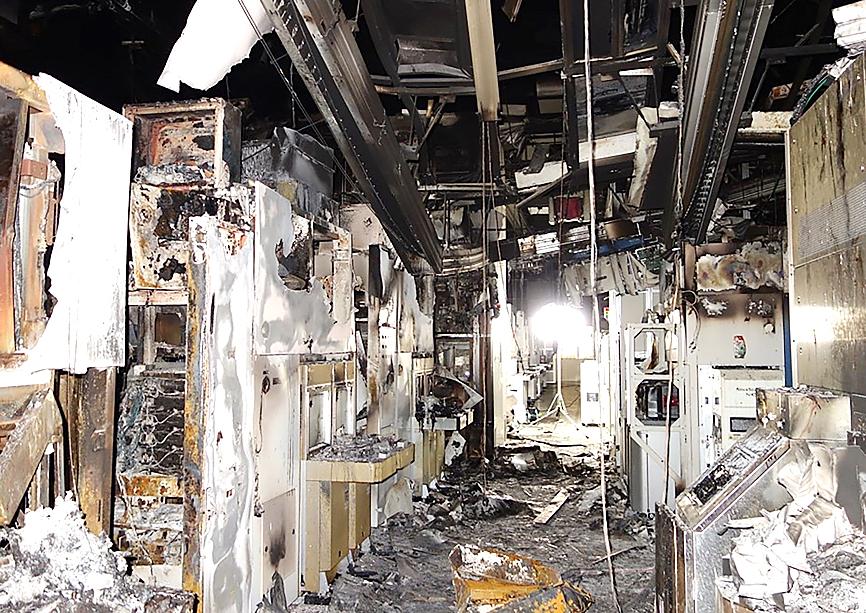Renesas Electronics Corp now believes that damage from a fire at its chip fabrication plant in northeast Japan was more extensive than first thought, a company spokeswoman said yesterday.
The company had initially said that 11 machines were damaged in a fire earlier this month at the Naka plant, but the Nikkei reported yesterday that the number of inoperable machines was now believed to be about 17.
While the Renesas spokeswoman would not confirm a specific number, she said that the chipmaker would share the extent of the damage by today.

Photo: AFP
Renesas had said that it would take at least one month to resume production on the wafer production line at the fire-hit fab, but replacing damaged machines could take several months.
An extended outage could add to a global shortage of chips that is disrupting some production of vehicles and electronic devices.
Renesas accounts for 30 percent of the global market for microcontroller units used in vehicles, and two-thirds of the chips produced at the facility are for the auto industry.
Shares of the firm yesterday edged upward 0.5 percent, in line with the broader Tokyo market.
A week ago, Renesas shares, and shares of big Japanese automakers, had tumbled following news of the fire.
The fire, caused by a power surge in one of the machines, came after an earthquake stopped production at the plant for three days last month.
In 2011, the plant shut down for three months after a deadly earthquake that devastated Japan’s northeast coast.
Separately yesterday, chip equipment maker Applied Materials Inc said that it terminated its US$2.2 billion deal to buy Japanese peer Kokusai Electric Corp from KKR & Co, as it did not get confirmation of a timely approval from the Chinese regulator.
Applied Materials had entered the deal in 2019, betting on a rise in demand for memory chips used at data centers, and in 5G smartphones and devices using artificial intelligence applications.
The chip equipment maker had said that the deal did not require the approval of the US Department of Justice, which had forced the company to scrap its US$10 billion takeover of Japan’s Tokyo Electron Ltd in 2015.
Applied is to pay a termination fee of US$154 million in cash to KKR HKE Investment for the deal, which was annulled on March 19.

NEW IDENTITY: Known for its software, India has expanded into hardware, with its semiconductor industry growing from US$38bn in 2023 to US$45bn to US$50bn India on Saturday inaugurated its first semiconductor assembly and test facility, a milestone in the government’s push to reduce dependence on foreign chipmakers and stake a claim in a sector dominated by China. Indian Prime Minister Narendra Modi opened US firm Micron Technology Inc’s semiconductor assembly, test and packaging unit in his home state of Gujarat, hailing the “dawn of a new era” for India’s technology ambitions. “When young Indians look back in the future, they will see this decade as the turning point in our tech future,” Modi told the event, which was broadcast on his YouTube channel. The plant would convert

‘SEISMIC SHIFT’: The researcher forecast there would be about 1.1 billion mobile shipments this year, down from 1.26 billion the prior year and erasing years of gains The global smartphone market is expected to contract 12.9 percent this year due to the unprecedented memorychip shortage, marking “a crisis like no other,” researcher International Data Corp (IDC) said. The new forecast, a dramatic revision down from earlier estimates, gives the latest accounting of the ongoing memory crunch that is affecting every corner of the electronics industry. The demand for advanced memory to power artificial intelligence (AI) tasks has drained global supply until well into next year and jeopardizes the business model of many smartphone makers. IDC forecast about 1.1 billion mobile shipments this year, down from 1.26 billion the prior

People stand in a Pokemon store in Tokyo on Thursday. One of the world highest-grossing franchises is celebrated its 30th anniversary yesterday.

Zimbabwe’s ban on raw lithium exports is forcing Chinese miners to rethink their strategy, speeding up plans to process the metal locally instead of shipping it to China’s vast rechargeable battery industry. The country is Africa’s largest lithium producer and has one of the world’s largest reserves, according to the US Geological Survey (USGS). Zimbabwe already banned the export of lithium ore in 2022 and last year announced it would halt exports of lithium concentrates from January next year. However, on Wednesday it imposed the ban with immediate effect, leaving unclear what the lithium mining sector would do in the